Mexicans Have Had Enough of U.S.-Backed Violence and Exploitation
The US funding of a "war on drugs" in Mexico, which was supposed to take aim at the traffickers, has instead largely fueled collusion between law enforcement, politicians and criminal syndicates The U .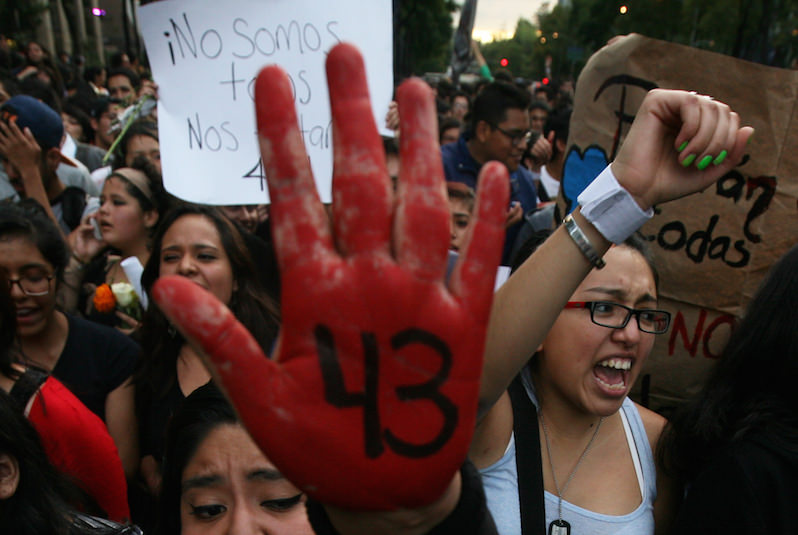 Demonstrators march in Mexico City on Oct. 22 in protest of the disappearance of 43 students from the Isidro Burgos Rural Teachers' College. AP/Marco Ugarte
Demonstrators march in Mexico City on Oct. 22 in protest of the disappearance of 43 students from the Isidro Burgos Rural Teachers' College. AP/Marco Ugarte
Mexico’s nationwide general strike on Thursday, Nov. 20 is a unified rallying cry to end the corruption, crime and violence that have plagued the country for decades and are symbolized most recently by the apparent slaying of 43 students in Ayotzinapa, Guerrero. But, lest we Americans consider ourselves outsiders, observing another nation’s mayhem with detachment, it is important to clarify that Mexico’s problems are in large part our doing.
Communities in Guerrero, Chiapas and other states in Mexico have seen their lands stripped of resources to appease the lure of foreign investment via the North American Free Trade Agreement, championed by the U.S. under various presidents starting with Clinton. Concurrent with the rise of poverty caused by free trade has been a steady increase in organized crime and narco-trafficking. The U.S. funding of a “war on drugs,” which was supposed to take aim at the traffickers, has instead largely fueled collusion between law enforcement, politicians and criminal syndicates.
The students at the heart of today’s crisis are the victims of this wretched collaboration. Here is the story that has emerged so far: The 43 men were studying at a teacher training school called the Raúl Isidro Burgos Rural Teachers’ College in Ayotzinapa. They had traveled to the nearby town of Iguala to protest what they saw as discrimination in hiring practices and also to raise funds for their school. Iguala Mayor Jose Luis Abarca, fearing that they would interrupt a speech that his wife was giving at a conference, ordered the police to round them up. The police apparently turned the students over to a local drug cartel called Guerreros Unidos that is said to count the mayor and his wife as high-ranking members. Some of the gang members arrested in connection with the missing students claim they killed all 43 men and incinerated their bodies.
If politicians, police and criminals are working together to disappear people, what measure of a civilized and democratic society remains? In answer to that question, communities have organized themselves to provide for their own security as best as they can.
Roberto Flores is a professor of Chicano studies at Cal State Los Angeles and the founder of Eastside Cafe, a space in El Sereno, Calif., that was in part inspired by the Zapatista movement in Chiapas. In an interview Monday on “Uprising,” he stated, “What’s happened in Ayotzinapa … and the response to it, cannot be understood without understanding the influence and impact of Zapatismo from 20 years ago.” What Flores is referring to is the moral force behind the Zapatista Army of National Liberation, which first emerged in the indigenous communities of the state of Chiapas on Jan. 1, 1994, the same day that NAFTA went into effect. The Zapatistas armed themselves, confident of their own ability to provide security and stability in a community they consider “autonomous.”
In cities like Ayotzinapa, a similar sense of autonomy has taken root in response to state violence, and inspired to an extent by Zapatismo. A model of what is known as “community policing” has reportedly spread to nearly 80 towns and villages in Guerrero. Flores explained that “the development of an autonomous community with its own security system is a way to move in the direction of independence and the beginnings of a resolution to the whole narco-state.”
Antonio Arias is a Los Angeles-based activist who works closely with local autonomous communities in Guerrero. Speaking alongside Flores in the interview, he contextualized the case of the missing students, saying, “Just a year ago, the Mexican minimum wage was comparable to Haiti’s, so the attacks on communities by the elite is pretty severe. Add to that the mass killings all over the country. [All that was needed] was just one thing that would set it off.” I asked if the story of the missing students was the proverbial “straw that broke the camel’s back,” to which he responded, “it was a pretty big straw.”
Mexican President Enrique Peña Nieto, a strong U.S. ally, faces the biggest challenge of his short tenure in the protests that have erupted. So far he is not handling the situation well. When protesters burned the door to the National Palace in Mexico City during angry demonstrations, Nieto responded, “Mexican society says no to violence. … We say yes to justice, order, harmony, tranquility, and we say yes to the application of justice.”
Flores said those statements were “the height of hypocrisy” and “sophistry to the max. It’s amazing that he can even say that when we know that what he means by justice is violence, brutality, terrorism — it’s fascism.” Arias explained, “This government has no place to hide. Its only way out is violence. They’re pretty cornered.”Nieto is also facing severe criticism for being out of the country last week during the height of the protests. He was at the Asia-Pacific Economic Cooperation forum and defended his travel plans, saying, “two out of every three dollars of wealth” in Mexico depends on foreign trade. But that is precisely part of the backdrop against which the case of the missing students ought to be viewed. Flores asserted, “Just because it’s a narco-state, it does not mean it’s not part of the global economy. As a matter of fact the narcos go hand in hand with it,” given that the drug war and its consequences have coincided with the opening up of Mexico’s economy to foreign investment and flourished within the resulting chaos of poverty and lawlessness.
Flores shared some grim figures that underscore U.S. responsibility: “There’s been $3 billion transferred to the Mexican army from U.S. taxpayers, through Plan Merida, supposedly to fight drugs.” He added, essentially, “you’re giving the drug lords money to fight drugs.” The Merida Initiative, in the words of the State Department, “is an unprecedented partnership between the United States and Mexico to fight organized crime and associated violence.” But as Mexicans have witnessed firsthand, it has only fueled crime and violence.
Estimates place the number of Mexico’s disappeared at 22,000. The number of dead whose bodies are accounted for total a whopping 60,000 since 2006 alone, when then-President Felipe Calderon launched the “War on Drugs” with U.S. funding and pressure. The majority of Mexicans have in some way been touched by the pain of a missing or killed family member, friend or loved one. Mass graves dot the landscape with full knowledge of police agencies, so much so that the search for the 43 missing students has unearthed graves containing dozens of unrelated bodies. Violence against Mexican women, linked to the U.S.-backed drug war, has reached “pandemic” proportions. The 43 missing students have become a symbol for everything that people see is wrong with the current system in Mexico.
Mexican celebrities have also been speaking out. The country’s top three directors, acclaimed on an international stage for their work — Guillermo del Toro, Alfonso Cuarón and Alejandro González Iñárritu — issued a joint statement Nov. 10, saying, “We believe that these crimes are systemic and indicate a much greater evil — the blurred lines between organized crime and high-ranking officers in the Mexican government.” Popular actor Gael García Bernal reflected the rage of the Mexican public in an interview in Latin Times on Monday, saying, “We are ashamed, sad, angered, we’re fed up, we’re … I don’t know, it’s just incredibly terrible.”
People are too angry to sit back anymore. Hundreds of thousands have marched in cities across Mexico relentlessly. Organizers have blocked streets, been arrested, burned down government buildings and clashed with police. Arias put Mexico’s uprising into a global context, saying it was part of the trajectory that includes “the indignados in Spain and the Arab Spring.” People’s “consciousness,” he said, “is trying to explode, to find its way through society.”
Activists have launched social media campaigns playing up the words of government officials such as Attorney General Jesus Murillo Karam, #YaMeCanse, which translates as “I am tired.” That sentiment, perhaps better than any other, expresses just how frustrated Mexicans are with the status quo.
Your support is crucial…With an uncertain future and a new administration casting doubt on press freedoms, the danger is clear: The truth is at risk.
Now is the time to give. Your tax-deductible support allows us to dig deeper, delivering fearless investigative reporting and analysis that exposes what’s really happening — without compromise.
Stand with our courageous journalists. Donate today to protect a free press, uphold democracy and unearth untold stories.

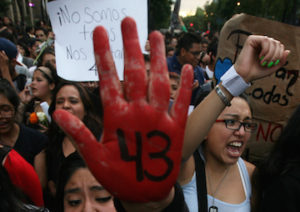
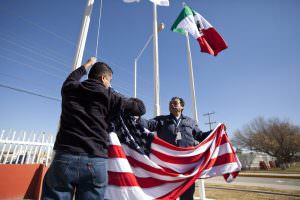

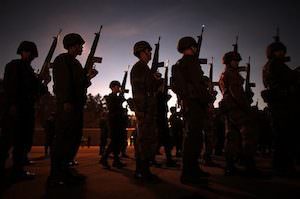
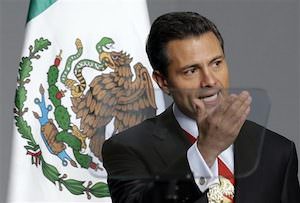



You need to be a supporter to comment.
There are currently no responses to this article.
Be the first to respond.